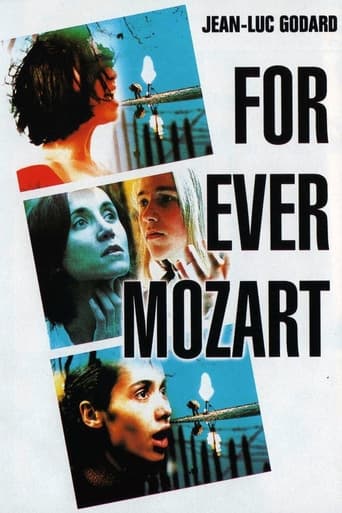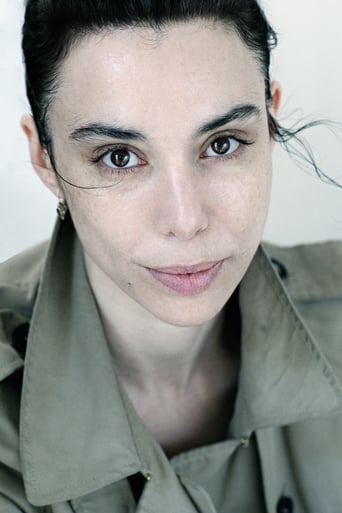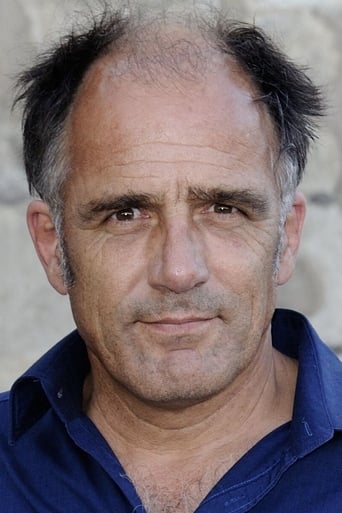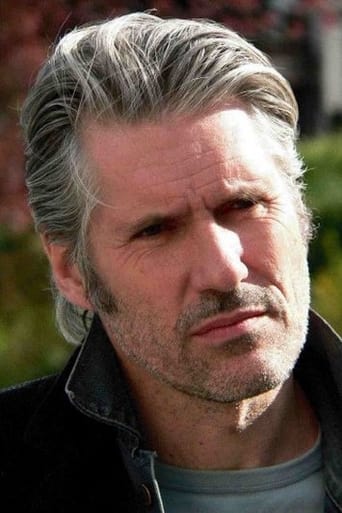chaos-rampant
Pointless, the negative reviews damn this film. Yes, but only if we arrive here expecting a narrative separated from the life and legacy of its author. But if we have apprenticed in Godard's work and stuck with him, for better or worse, the inscrutable film is a rich text which can be read, to various effects.The prophecies of the ancient oracle at Delphii hinged on the presence of the coma, moving the coma to the next word the entire sentence attained new meaning. The prophecies were oral however, which means the coma was a later adoption, by the receiver. Moving the figurative coma here we get different interpretations, both meaningful in their contradiction.A couple of young French intellectuals with aspirations for political activism embark on a trip to Sarajevo to stage a Musset play (or make a film, I'm not clear on this). Along with them tags halfheartedly their old uncle, a theatrical writer. When we see him sitting on a bed, a grizzly crone wearing a hat, ruminating quotes from a book in hand, we know who he is or is meant to be. In the 60's Godard spoke through radical, troubled youths like these, now he feels separate, of an older, bitter generation who fought its struggles and stepped aside, to let the following generation take its stab at the political chimera.Two instances in the film, figurative comas, are important in this aspect.One is the arrival of our youths at Sarajevo, criminal no man's land torn by a bloody civil war. Youth radicals from Western countries in the 60's enlisted in various revolutionary causes like the PLO, what used to be anticipated hopefully is now met by Godard with cruel, bitter disillusionment. Our protagonist are not greeted as brother guerillas come to join a cause that matters, instead they're summarily arrested. The dream of revolution is here crashed under torture, ridicule, ingloriously digging their own graves. A corrupt Yugoslavian general presides over the aimless carnage, now and then a soldier routinely makes the rounds of mortars planted in the middle of nowhere, casually firing rounds at unseen enemies. But is that failure one of ideas or people, we'll have to decide as viewers.The other, personally poignant for Godard, is the uncle who abandons these youths before Sarajevo, running off with a truck of film equipment to make a film. Shifting the coma here we may read this variously, as Godard recognizing with the hindsight old age permits the folly of what is to come, or as Godard reflecting with some regret and shame that he wasn't more involved in that cause in his time and merely made films.Whatever meaning we choose to ascribe, Godard here doesn't follow the revolution, he openly abandons it (which he did more than a decade ago, perhaps only now mustering the courage to clearly show on film). But, having withdrawn from the dream that used to matter, where does he turn next to devote himself? We may know the answer from Godard's career, the films he chose to make, the subjects that troubled him next. On the set of the film-within which the uncle assists in making, he stages a second absurdist comedy, this time a biting satire of the debasement of filmmaking. He establishes this with running gags. Cinematographers always an f-stop off, walking around trying in vain to get light readings, a megalomaniac director who demands for his shots more water in the sea.Both these points, politics and cinema, are met with disillusionment. If nothing exists after the end and this life is all that matters, as we're told in the film, then the life we're shown here doesn't amount to much, the struggle is solitary and disheartening. In many respects this is a continuation of Week End where in the end of it youths marched off with joyous clamor and violence to a revolution, only now Godard wastes no cheap shots mocking the bourgeois and includes himself and the revolution in the recipients of his ire. At film's end, Godard, the uncle, is sitting alone with a book, overhearing a rehearsal of Mozart in a different room ("too many notes, they said"). The film then elucidates, bitterly or smartly, the events and decisions that brought him to where he is now, in 1996.
Chris Bright
This seemed quite accessible to me, at least in the context of late Godard. The title is a pun on "Il Faut Rever", setting the theme of art in troubled times. The story is about a group of young and somewhat naive actors setting off to perform the Musset play "On Ne Badine Pas Avec L'Amour" (One mustn't trifle with love") in Sarajevo and coming the inevitable cropper on the way. Meanwhile the lead actress's grandfather plays the now standard "Godard" role of an old filmmaker battling with producers and technology to get his film made.The photography and use of music is often heart-stoppingly beautiful, the response to the Balkan conflict seems to me as serious as it should be while contrary to other comments there is certainly humour here both bible-black (a woman spouts philosophy while digging her own grave, a guerrilla shows a comrade what we assume are holiday snaps but are revealed to be photos of the massacre of her family) and knockabout (a film producer complains Lake Geneva has "not enough water", the audience for the old man's "Fatal Bolero" comments on a film suspiciously similar to the one we have just watched).As ever there are numerous references which those of us not steeped in French literature will miss, but overall this seems the most direct and outward-looking of Godard's later films. I liked it very much.
nunculus
Godard's sombrest film, this meditation on the triumph of art over atrocity illustrates the Balkans' horrors as the slapdash Brechtian theatre of LES CARABINIERS. But both the world and Godard have changed in the last forty years, and the approach seems offensively academic. Even in films as recent as FIRST NAME: CARMEN and KING LEAR, Godard sprinkled atop his gnomic aphorisms and contrapuntal poetry moments of chaotic, dissonant humor. Here, blank-faced actors recite "Isn't the presence of evil worse than the absence of good?" as if off cue cards. In the pearly, mystical clarity of his images and his sounds--the latter appearing both more naturalistic and rhapsodic than ever--Godard remains a world-class master. But since his recent JLG PAR JLG, it would seem the last movement of his career is toward a crotchety cultural conservatism. His garret full of Goya, Musset and Marivaux seems colder, lonelier and less companionable than ever.
Joe M
...said a couple exiting the movie theater just as I was entering to watch this. Hmm, not a good sign, but who knows? Different strokes for different folks, after all. Well, nope. They were being kind. Godard has released work that is passionate (Contempt), entertaining (Band of Outsiders), sometimes both (My Life to Live). This is just dull intellectualism, that grates on the nerves pretty quickly. During my showing, literally half of the audience had walked out by the end of the film. If only I had been so wise.






